
THE VOICE OF INTERNATIONAL LITHUANIA
|
VilNews has its own Google archive! Type a word in the above search box to find any article.
You can also follow us on Facebook. We have two different pages. Click to open and join.
|
Front page
Echos and absences
- Posted by - (0) Comment

Roger Cohen
By Roger Cohen,
Columnist, International Herald Tribune and New York Times
I look forward with considerable emotion to returning to Zagare for the unveiling of a plaque that will commemorate the slaughter of more than 2,250 Jews in the town on October 2, 1941. More than three score years and ten have gone by since that mass murder without full acknowledgment of its scope. The men, women and children taken from the main square into the woods to be killed have remained anonymous, mere shadows, their fates at first concealed by Soviet political calculation and taboos, and then only falteringly recognized after Lithuania gained independence in 1990. I do not know the Jews who were killed but I know that each of them valued life and its joys as we do, and I know that my grandmother, Pauline (“Polly”) Soloveychik would have been among them had she not left Zagare for South Africa in the early 20th Century. For me, the fate of the Zagare Jews is personal.
- Bookmark :
- Digg
- del.icio.us
- Stumbleupon
- Redit it
- Posted by - (0) Comment
Zagare Cherry Festival
„You can‘t fudge the history“
12–15th of July 2012

Zagare Cherry Festival – a traditional event which helps to develop Northern Lithuania, former Semigallian territory, culture, unique and attractive image of Zagare as one of the oldest towns in Lithuania and beautiful tourism destination, promoting the development of this the former Northern Lithuanian cultural center of the eighteenth century. Cherry Festival and Zagare is an inexhaustible storehouse of knowledge, new impressions and events. Culturally crossing a couple of centuries of Zagare history, the eighth Cherry Festival will help to discover, explore and understand the uniqueness of the town. The main event of the festival, using historical materials and staged events of the past, will raise from oblivion the image of the historical market square. Although the present town and the town of those old separates only 200 years time, these "cultural centers" in Cherry Festival will be closer together than ever before. The time machine and all the characters will carry away to the past where the ancient craftsmen is working, merchants schooling, costumed waiters invite for dinner, the bagpipe and an old gramophone begin to play, still managed to play the older version of the melody than itself, which touched both young and old hearts...
- Bookmark :
- Digg
- del.icio.us
- Stumbleupon
- Redit it
- Posted by - (0) Comment
A new film, Land Of Songs, will show the Lithunian dainos (songs) as living, breathing stories, deeply rooted in their natural surroundings, daily routines, and rich histories.
Močiutės dainos
Land of Songs Director Aldona Watts with the močiutės: Stasė Bogušienė,
Jonė Dvareckienė, Marytė Klimavičienė, and Pranė Barysienė.
Hello and Sveiki!
My name is Aldona. I’m a Lithuanian-American multimedia producer from San Francisco, living and working in Brooklyn. This project has been a dream of mine for so long now that I’m thrilled to finally make it happen!
It all began seven years ago. My family and I visited Lithuanian friends in the village of Puvočiai, and they invited their neighbors, the močiutės (or "little grandmas"), over to sing for us. These močiutės, they told us, were the last generation in a long line of traditional folk singers with ancient roots.
At twilight we laid tables under the trees with food and drink. I barely noticed the faint sound of voices weaving through the forest, until they mounted to a loud front of song. And then I saw them: a small herd of hunched figures making their way towards us, their white headscarves bobbing through the trees.
The songs were at once melancholy and joyful; the hauntingly beautiful harmonies seemed from another world. After each song, the women’s wrinkled faces cracked into wide smiles, and the ghostly echo of the voices ringing through the trees was replaced by raucous cackling.
When it was time to say goodbye, the močiutės left as they came, singing all the way. Long after they disappeared, their voices remained.
- Bookmark :
- Digg
- del.icio.us
- Stumbleupon
- Redit it
- Posted by - (0) Comment
Timothy Snyder, author of Bloodlands: Europe between Hitler and Stalin:
Perhaps we can find
ways to talk to each other
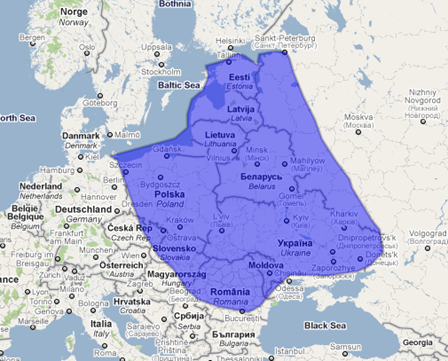
A rough definition of Snyder's "Bloodlands" (by Timothy Nunan).
By Ellen Cassedy
“Even if all you want to do is understand your own group, you have no choice but to understand the history of others.”
That’s what Timothy Snyder, a professor at Yale University and the author of Bloodlands: Europe between Hitler and Stalin (Basic Books, 2010), had to say at a recent roundtable at the Tolerance Center in Vilnius.
I watched a webcast of the session – and welcomed the opportunity to revisit Snyder’s book, which I’d found challenging on two accounts.
First, immersing myself in the atrocities of the mid-20th century was no easy task. Between 1933 and 1945, in the region Snyder dubs the bloodlands – the Baltics, Belarus, most of Poland, Western Russia, and Ukraine – an unprecedented 16 million people were killed.
Second, Bloodlands required me to consider, simultaneously, the fate not only of my own group, as Snyder puts it, but also the history of others. That wasn’t easy either.

Timothy Snyder
- Bookmark :
- Digg
- del.icio.us
- Stumbleupon
- Redit it
- Posted by - (0) Comment
By the end of the book, author Daiva Markelis discovers
Her own way to be both
Lithuanian and American.
Daiva Markelis interviewed by Ellen Cassedy
Daiva Markelis's memoir, White Field, Black Sheep: A Lithuanian-American Life (University of Chicago Press, 2010), tells the story of her growing up as the daughter of postwar Lithuanian immigrants in the 1960's and '70's near Chicago.
The book alternates between the story of Markelis's youth – especially her struggle for cultural identity – and a series of touching later scenes with her octogenarian mother.
We see Daiva and her sister begging for real American Halloween costumes and a plastic Christmas tree, while the parents insist on speaking Lithuanian and holding true to their traditions. The descriptions of Catholic school, Lithuanian scout camp, and the family resort owned by Valdas Adamkus (who later returned to Lithuania and became its president) are tart and funny.
Markelis reveals a culture as well as a personal history. She writes affectionately about the streets, the buildings, even the tackiest billboards of her home town - while, at the same time, not shrinking from frank portrayals of racial tension and alcohol abuse. The portraits of her parents are filled with a lovely tenderness, even as she pokes fun and reveals some of their failings.
This tale of seeking cultural identity within an immigrant community comes to an uplifting conclusion. By the end of the book, Markelis has discovered her own way to be both Lithuanian and American.
- Bookmark :
- Digg
- del.icio.us
- Stumbleupon
- Redit it
Is Lithuanian mafia regaining strength?
- Posted by - (0) Comment

Andy Hernandez after the mafia attack last Friday.
My friend, Filipino Andy Hernandez, a veteran Newsweek war photographer who now lives in Lithuania, where he, among other things, makes his living by owning and operating a handful of restaurants, was brutally beaten in one of his own restaurants last Friday.
The attack on Andy and his wife appears to be racially motivated, and unfortunately, racism is a very, very serious problem in present day Lithuania.
It seems, also, as if the recession has provided various mafia groups more room and more power. Smuggling and production of drugs, human trafficking, prostitution and other things with a basis in Lithuanian mafia groups is an increasingly serious problem for Europe.
The assault on Andy and his wife is only the tip of an iceberg that is growing ever greater.
- Bookmark :
- Digg
- del.icio.us
- Stumbleupon
- Redit it
Local mafia boss arrested for the assault
- Posted by - (0) Comment
A Vilnius court on Tuesday sanctioned arrest of Stanislovas Narkevičius,
who is suspected of having assaulted a Filipino businessman in the town
of Trakai, 30 km from Vilnius. The man was arrested for two weeks.
"15 Minutes" photo. / Stanislav Narkevicius
Airinė Šerelytė, the court spokeswoman, confirmed to Baltic News Service (BNS) that the court had sanctioned arrest of Stanislovas Narkevičius, aka Narkuša.
Prosecutors had asked the court to arrest Narkevičius for three months.
On Monday, prosecutors launched an investigation into the assault of Andy Hernandez, 54, and his wife, 39. Hernandez owns a café in Trakai and his wife works as director there.
The incident took place at around 9:30 PM on Friday. A group of men entered the café and assaulted Hernandez and his wife. They were later both taken to hospital.
Narkevičius was detained for affray on Sunday. He faces up to two years in prison.
Žana Sokolovska, a prosecutor in charge of the investigation, told BNS there might be more suspects in this case.
Hernandez filmed the assault with his mobile phone and the video was published online. It shows one of the assailants cursing the café's staff.
- Bookmark :
- Digg
- del.icio.us
- Stumbleupon
- Redit it
17 years since execution of Vilnius mafia boss
- Posted by - (0) Comment
Boris Dekanidze, head of the "Vilnius Brigade", the last person executed by
Lithuania prior to its abolition of the death penalty in 1998.
Boris Dekanidze was the head of the "Vilnius Brigade" organized crime gang in Lithuania. In 1994, he was convicted of ordering the murder of a journalist and was executed. Dekanidze was the last person executed by Lithuania prior to its abolition of the death penalty in 1998.
Dekanidze was born in Lithuania to Georgian Jewish immigrants. He was a stateless person, not having been granted citizenship in Lithuania or Georgia. In Vilnius, he was a leader of the Vilnius Brigade mafia group.
In 1993, after receiving a number of death threats, Vitas Lingys, one of the founders and publishers of the newspaper Respublika, was shot at point-blank range near his home in Vilnius. Dekanidze was arrested and charged with ordering the murder, which police said was carried out by another mafia guy, Igor Akhremov.
In a 1994 trial, Dekanidze was convicted of deliberate murder by a three-judge panel. Dakanidze claimed he was innocent, and the evidence against him was primarily the testimony of Akhremov, who claimed to have carryied out the killing on Dekanidze's orders. On 10 November 1994, Dekanidze was sentenced to death and Akhremov was sentenced to life imprisonment.
Lithuanian authorities shut down the Ignalina nuclear power plant after a terrorist threat was made against it the day after the convictions were handed down. Dekanidze appealed the decision to the Supreme Court, but it ruled in February 1995 that there were no grounds for reviewing the death sentence. His appeal for clemency to President Algirdas Brazauskas was also refused.
Dekanidze was executed on 12 July 1995 in Vilnius by a single shot to the back of his head. The execution has been criticised at being carried out even as the Lithuanian parliament was debating abolition of the death penalty.
No one has been executed by Lithuania since Dekanidze's death. Lithuania abolished the death penalty for all crimes in 1998 after the Lithuanian Constitutional Court ruled that the death penalty was unconstitutional.
- Bookmark :
- Digg
- del.icio.us
- Stumbleupon
- Redit it
Mafia hitman set free
- Posted by - (0) Comment
Igor Akhremov.
Igor Akhremov, a member of the criminal gang Vilnius Brigade who killed journalist Vitas Lingys in 1994 was released on parole in April this year.
Vilnius Regional Court overturned the ruling of Vilnius Third District Court and upheld Akhremov's appeal. On 2 March Vilnius Third District Court had rejected the offer of Vilnius Correction House to release Akhremov on parole. The Court said that upon his release the principle of justice would not be achieved as he serves for three extremely dangerous activities.
While Vilnius Regional Court satisfied the appeal describing him as a friendly and polite person, known for good behaviour in prison. Akhremov was assigned to the lowest risk group. The ruling of Vilnius Regional Court is final, not subject to appeal and comes into force immediately. In 1994, Akhremov was convicted for murdering journalist Lingys of the daily Respublika on 12 October 1993.
Boris Dekanidze, the then leader of the criminal gang Vilnius Brigade, who ordered the murder, was sentenced to capital punishment. At first, the court sentenced Akhremov to life imprisonment, but later the Supreme Court reduced the sentence to 25 years of imprisonment. His term of punishment was to expire in autumn 2018.
- Bookmark :
- Digg
- del.icio.us
- Stumbleupon
- Redit it
Lithuanian summer means Šaltibarščiai – cold beet root soup –
and a refreshingly cold beer!
Lithuanian summer traditions are different from what you usually find on European café tables or outdoors on a summer patio or garden. In particular, this applies to dishes Lithuanians gorge themselves with through hot summer months.
Take for example the cold beet soup, Šaltibarščiai, that you see pictured above. Take some time to read what our associate editor, Vin Karnila, writes about this and another, at least as famous Lithuanian dish....
‘Two Lithuanian dishes you simply have to try!’
To a great summer meal also belongs a refreshing cold beer. Look what Vin has to say about this foamy, beautiful Lithuanian brew...
- Bookmark :
- Digg
- del.icio.us
- Stumbleupon
- Redit it
 Ellen Cassedy |
 The book We are Here |
 Daiva Markelis |
Professor Daiva Markelis, Illinois:
Essay/review of Ellen Cassedy's book We Are Here
I’ve always been interested in Lithuanian history and, lately, in Jewish-Lithuanian history. Jews have been living in Lithuania since the 1300s, have contributed to the work of nation building throughout the centuries, suffered alongside their Christian neighbors during the reign of the tsars. Despite their once considerable numbers—over seven percent of the population at one time—and formidable achievements, I don’t remember ever reading about them in Lithuanian Saturday School vadoveliai, readers filled with patriotic poems, variations of stories about the founding of Vilnius involving a dream about an iron wolf, and photographs of storks nesting atop the thatched roofs of simple country cottages. (Every year the same stork seemed to appear in yet another edition of the book.)
At home, my mother talked about a Jewish friend she’d had in Klaipeda. My father remembered a Jewish peddler who sold fabric and buttons. So, yes, Jews had lived in Lithuania, but only a handful over six centuries—that’s the impression I received. Soon after Lithuania regained her independence, I learned from my Aunt Birute about the once-thriving Jewish community in Dusetos: “This was a grocery store,” she said as we walked down Kazys Buga Street, “and here stood a bakery, and beyond that, over there, the best restaurant in town.”
I tell the Dusetos story to Ellen Cassedy, author of We Are Here: Memories of the Lithuanian Holocaust, recently published by the University of Nebraska Press, over coffee at the Corner Bakery. She nods: “The collapse of the Soviet Union made it possible for people to speak openly about what happened during the occupation. During both of the occupations, Communist and Nazi.”
- Bookmark :
- Digg
- del.icio.us
- Stumbleupon
- Redit it
200 years since Napoleon arrived in Lithuania
- Posted by - (0) Comment
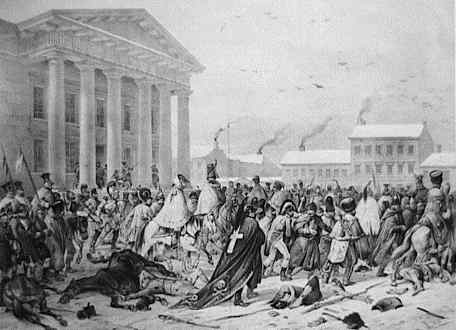
French Army in the Town Hall Square of Vilnius, Lithuania, 1812
By Jonas Damelis (1780—1840), a neoclassicist artist
associated with the School of Art at Vilnius University
By Vytautas J. Šliūpas
Two hundred years ago – on June 24, 1812, the French Grande Armée, led by Emperor Napoleon Boneparte, crossed the Nemunas River near Kaunas and invaded Czar Alexander I's Russia. I will not attempt to delineate the historical facts that are well known, but will present several episodes which deal with Lithuania and Lithuanians. Readers may be interested to know these facts, because Napoleon's first and last steps of the Russian campaign were taken in Lithuania.
- Bookmark :
- Digg
- del.icio.us
- Stumbleupon
- Redit it
- Posted by - (0) Comment
Vilnius – the city built
on human bones

Remains of a Grand Armée Soldier buried in Vilnius.
The skull of a Napoleonic soldier, who died during the French army's
1812 retreat from Moscow, discovered on a Vilnius construction site.
Picture: AFP/CNRS/Universite de la Mediterranee/Pascal Adalian
Vilnius, venerable capital of Lithuania, is sometimes called 'the city built on human bones'. It stands in the main Berlin to Moscow corridor, which for over 200 years has been the battlefields of the armies of Napoleon, the Tsars of Russia, Hitler and Stalin, as well as Poles and Prussians - hence its sinister description.
Early in 2002, while bulldozing some ugly Soviet barracks on the outskirts of Vilnius, municipal workers uncovered a mass grave. Thousands of skeletons were discovered there, laid out neatly in layers. Where did these bones come from? Were they those of Jews, massacred by the Nazis? No. For here's a metal button, with '61' stamped on it. Here's another, stamped '29'. And here's a patch of an ancient uniform, once blue. Also to be seen is a gold 20-franc coin from Napoleonic times, and a 'shako' (a French infantryman's helmet), squashed flat.
The drivers of the bulldozers stopped in their work. This was news - archaeological news - and these were the remains of some of the men that Napoleon had led into Russia in his pursuit of world supremacy in 1812.
- Bookmark :
- Digg
- del.icio.us
- Stumbleupon
- Redit it
- Posted by - (0) Comment
The new President of Lithuanian Industrialists' Confederation, Robertas Dargis, about the financial
crisis in Lithuania:
Our government
has failed
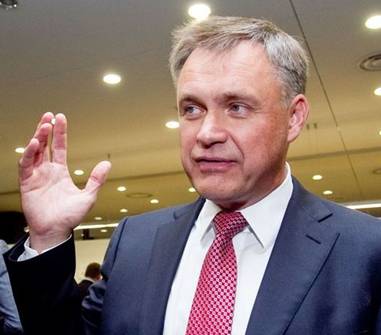
ROBERTAS DARGIS
Irmanto Gelūno/ www.15min.lt photo
“We took the easiest way – additional borrowing. The rate of change in our sovereign debt is enormous compared to other European countries. We had a debt of 17.4 billion litas (5 billion euros) and over the four years of the crisis, it has swollen to 51 billion (14.8 billion euros) – that's the figure we're having by the end of this year. Such a hike in debt is very dangerous to the state, so at least today, we must choose measures that make future predictable.”
The Lithuanian Industrialists Confederation (LIC) has elected a new president – businessman Robertas Dargis, CEO of the Eika Group. He says business is every country's engine for progress and not, as some imagine, a clique of self-seeking lobbyists.
Dargis, who runs a construction company, defeated a strong competitor in his running for presidency – Visvaldas Matijošaitis, CEO of Vičiūnų Group. Dargis succeeds the previous LIC president, late Bronislavas Lubys, and will head the organization for four years.
- You have been given great responsibility – to preserve the confederation's authority and influence on government policies. How are you going to do that?
- I believe that the LIC will remain the most influential organization in the country; however, it would be odd to declare that this is my goal. To my mind, it is more important that it stays a viable and dynamic structure that unites businesspeople and is able to participate on equal terms in the countries financial and economic processes, offer solutions to problems. For that purpose, however, one needs a clear and, most important, long-term government policy.
- Over the last several years, when business was undergoing hard times, government policies were somewhat lacking in consistency?
- The state should be on harmonious and predictable terms with the business community. Before joining someone in marriage, both partners thoroughly reflect if that is the person one imagines spending one's future and old days with. If this person will not only listen but hear what you say. In any given country, business can only thrive if it can predict the situation, if it does not have to fear that one morning, some politician will climb on a box an announce additional taxes: VAT going up to 25 percent – so we can all live better – and then a 5-percent property tax on top of it – to seal our happiness. In that case, business feels confused, all calculations don't make sense any more, everything collapses and you don't know what to do.
- Are you saying that measures taken by the state to pull the country out of the financial crisis did more harm than good?
- What measures were they? I, for one, have never seen them in one clear and consistent list.
- Bookmark :
- Digg
- del.icio.us
- Stumbleupon
- Redit it
The tense Polish – Lithuanian relations
- Posted by - (0) Comment
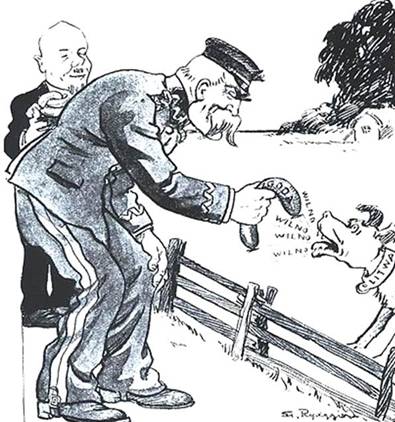
A satirical picture from interwar Polish press (around 1925-1935): a caricature of Marshal Józef Piłsudski and Lithuania, criticizing Lithuanian unwillingness to compromise over Vilnius region. Marshal Piłsudski offers the sausage labeled "agreement" to the dog (with the collar labeled Lithuania); the dog barking
"Wilno, wilno, wilno" replies: "Even if you were to give me Wilno, I would
bark for Grodno and Białystok, because this is who I am."
The tension will continue, until Poland will treat Lithuania
again as a sovereign and independent country
Opnion: Algimantas Gureckas
During the interwar period between First and Second World Wars the political leadership of reconstituted Poland aspired to a European great power status and conducted a policy of territorial expansion against its neighboring countries. As a result of several military campaigns in 1919-1920, Poland acquired considerable territories inhabited by non-Polish populations [see our VilNews articles on the Polish/Lithuanian war 1919-1920 at https://vilnews.com/?p=11551].
In Yalta and Potsdam conferences of 1945, the leaders of the victorious powers, United States of America, Great Britain, and the Soviet Union, established post-war borders of the Polish Republic. They endorsed the 1920 Curzon Line as its eastern frontier (1). This detached Western Ukraine, Western Belarus (2), and Vilnius region from Poland. In order to compensate Poland for the loss of these extensive, albeit mostly non-Polish territories, they assigned to it highly developed German territories of southern East Prussia, eastern Pomerania, Neumark, and Silesia (3). The victorious powers also autorized the expulsion of the entire German population from these territories(4).
The Polish people accepted the German lands as their due compensation for their suffering under the harsh German occupation during the war, but they regarded the loss of the eastern borderlands ("Kresy") as unjust detachment of territories lawfully belonging to the Polish state. However, Polish political leadership, the ruling communist regime, as well as the democratic underground, realized that any Polish claims to the lost territories in the East would undermine the Polish title to the newly acquired valuable lands in the West. Thus, eventually the view promoted by Jerzy Giedroyc, editor of an influential journal Kultura, and his collaborator Juliusz Mieroszewski prevailedthat Polish nation and state should sincerely renounce any claims to the interwar eastern territories.
- Bookmark :
- Digg
- del.icio.us
- Stumbleupon
- Redit it
- Posted by - (0) Comment
Letter from our VilNews’ Washington correspondent:

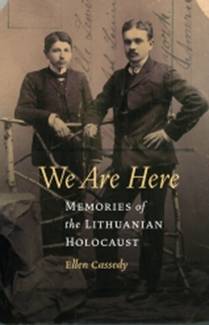
It was a pleasure meeting readers, librarians, booksellers, bloggers, and publishers’ reps at BookExpo America in New York City last week. I was honored to be among the 700+ authors signing books at the largest book trade gathering in the U.S. Here I am with Donna Shear, director of the University of Nebraska Press, my wonderful publisher.
A special treat was seeing Susan Nussbaum accept the Bellwether Prize for social engaged fiction from Barbara Kingsolver. Another highlight was visiting the Read Russia booth to chat about a possible Russian translation of We Are Here. And then there was the once-in-a-lifetime chance to pose with Olivia the Pig.
For more details, visit my website. Mark your calendar – we’d love to see you there!
Praise for We Are Here
“Pioneering… will reach out to Jews, Lithuanians, and all those who care about not replaying in this new century the disasters of the century that has just ended"
Michael Steinlauf
“…deeply moving…her book offers a unique perspective…complex human texture, rooted in an oft-forgotten Yiddish cultural context, a tapestry of events which elsewhere too often appear as one-dimensional. Readers will doubtless be immensely enriched by her experience.”
Dr. Saulius Suziedelis
- Bookmark :
- Digg
- del.icio.us
- Stumbleupon
- Redit it
VilNews e-magazine is published in Vilnius, Lithuania. Editor-in-Chief: Mr. Aage Myhre. Inquires to the editors: editor@VilNews.com.
Code of Ethics: See Section 2 – about VilNews. VilNews is not responsible for content on external links/web pages.
HOW TO ADVERTISE IN VILNEWS.
All content is copyrighted © 2011. UAB ‘VilNews’.

 Click on the buttons to open and read each of VilNews' 18 sub-sections
Click on the buttons to open and read each of VilNews' 18 sub-sections 















.jpg)



